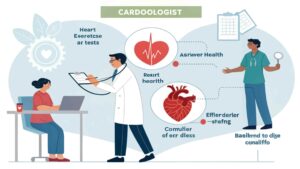Heart disease remains a leading cause of death worldwide—but many heart problems are preventable. Cardiologists emphasize that daily habits play a crucial role in protecting and improving heart health. Simple, sustainable lifestyle changes can lower your risk of heart attacks, strokes, and high blood pressure. These changes not only benefit your heart but also improve your overall energy, mood, and longevity.
Eat a Heart-Healthy Diet
Cardiologists often recommend the Mediterranean or DASH diet, which focuses on:
- Fresh fruits and vegetables
- Whole grains (brown rice, oats, quinoa)
- Lean proteins like fish, chicken, and legumes
- Healthy fats such as olive oil, nuts, and seeds
- Limited intake of red meat, sugar, and processed foods
Reducing sodium and trans fats is also essential for lowering blood pressure and cholesterol.
Get Regular Physical Activity
Aim for at least 150 minutes of moderate exercise or 75 minutes of vigorous exercise each week. Good heart-friendly activities include:
- Brisk walking
- Cycling
- Swimming
- Dancing
- Resistance training 2–3 times per week
Exercise strengthens the heart muscle, improves circulation, and helps control weight and stress.
Quit Smoking
Tobacco is a major risk factor for heart disease. Cardiologists strongly advise quitting smoking to:
- Lower blood pressure
- Improve oxygen levels in the blood
- Reduce the risk of plaque buildup in arteries
- Boost overall cardiovascular health
Support programs, nicotine replacement, and medication can help with quitting successfully.
Manage Stress
Chronic stress increases blood pressure and inflammation. Cardiologists recommend stress management techniques such as:
- Deep breathing or meditation
- Yoga or tai chi
- Journaling
- Engaging in hobbies or outdoor activities
- Maintaining social connections
Controlling stress benefits both your heart and mental well-being.
Maintain a Healthy Weight
Excess weight puts strain on the heart and raises the risk of conditions like high blood pressure and diabetes. Cardiologists advise:
- Tracking food intake and portion sizes
- Regular exercise
- Reducing sugary drinks and snacks
- Consulting with a dietitian if needed
Even modest weight loss (5–10% of body weight) can lead to significant health benefits.
Monitor Blood Pressure and Cholesterol
Regular check-ups help catch problems early. Cardiologists encourage:
- Checking blood pressure at home
- Getting cholesterol and glucose tests regularly
- Taking prescribed medications as directed
- Following up with your healthcare provider
Lifestyle changes can often reduce the need for medications over time.
Limit Alcohol Intake
Too much alcohol can raise blood pressure and damage the heart muscle. Cardiologists generally recommend:
- No more than 1 drink per day for women
- No more than 2 drinks per day for men
- Choosing red wine occasionally (in moderation) if alcohol is consumed
Some people should avoid alcohol altogether due to health conditions or medications.
Get Quality Sleep
Poor sleep is linked to obesity, hypertension, and heart disease. To improve sleep health:
- Aim for 7–9 hours of sleep per night
- Maintain a regular sleep schedule
- Limit screen time before bed
- Avoid caffeine and heavy meals at night
If you snore loudly or feel tired despite sleeping, talk to a doctor about sleep apnea.
Control Blood Sugar Levels
For those with diabetes or prediabetes, cardiologists stress the importance of:
- Low-glycemic foods
- Regular physical activity
- Avoiding sugary drinks and refined carbs
- Monitoring blood sugar levels
Managing blood sugar reduces the risk of heart and vascular complications.
Conclusion
Cardiologists recommend lifestyle changes that support heart health from every angle—diet, exercise, stress management, sleep, and routine check-ups. These steps can prevent or reverse heart disease and improve your quality of life. Start with small changes and stay consistent. Your heart will thank you for it in the long run.
















